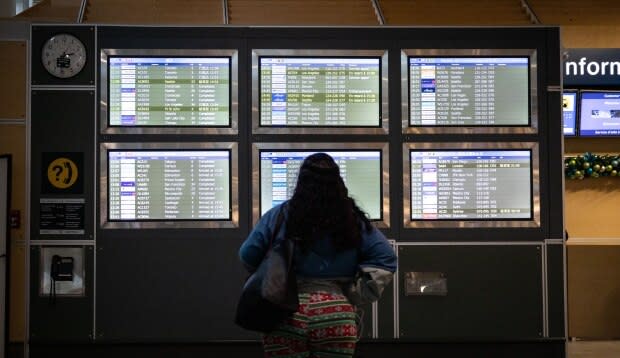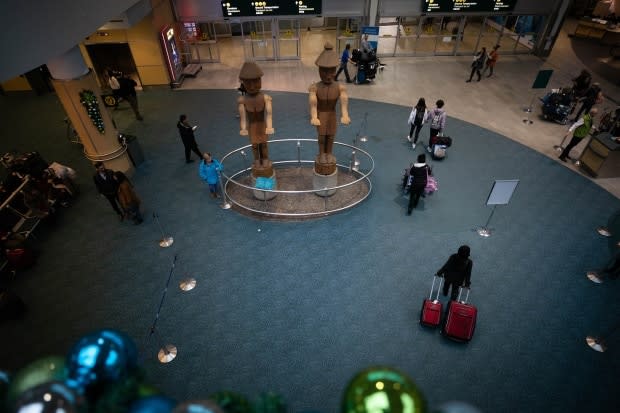Screening measures initiated at Vancouver airport for China coronavirus outbreak
Passengers at the Vancouver International Airport will encounter new screening measures as Canadian health officials keep a close eye on China's coronavirus outbreak, which has killed three people and infected more than 200.
The Public Health Agency of Canada says it will introduce messaging over the coming week on arrivals screens reminding travellers from Wuhan, China — the site of the outbreak — to inform a border service officer if they experience flu-like symptoms.
An extra health screening question will be added to electronic immigration kiosks. The changes will also be introduced at the Toronto and Montreal airports.
The measures are less stringent than those introduced over the weekend at three major airports in New York City (JFK), San Francisco and Los Angeles, where incoming airline passengers are being screened for symptoms.
"Right now, it's not a major threat to us here in Canada but we are watching very carefully," said Dr. Bonnie Henry, B.C.'s provincial health officer.
Coronaviruses are a family of viruses that typically cause mild cold-like symptoms. Some forms of the infection can lead to more severe illnesses, such as pneumonia, respiratory and kidney failure.
The virus is linked to the same family of viruses as Severe Acute Respiratory Syndrome (SARS), which killed dozens of Canadians in 2002 and 2003, and Middle East Respiratory Syndrome (MERS). Both caused severe illnesses in humans and were transmitted rapidly around the world.
"This one doesn't seem to be as easily transmitted from person-to-person and we haven't seen the explosive kinds of outbreaks that we saw with MERS and SARS," Henry said.
"That's a little bit reassuring but it's still early days and there's much we don't know."

Risk to Canadians is low
The outbreak, which originated at a seafood market in the city of Wuhan in central China, has since spread to Japan, Thailand and South Korea, with 136 new cases reported over the weekend.
On Monday, China confirmed the first human-to-human transmission, which could make the virus spread more quickly and widely. China's Xinhau News Agency said 224 cases have been reported and 217 confirmed.
Fears have also been raised that the illness could spread to Canada, as people travel for Lunar New Year on Saturday.
The Public Health Agency of Canada says the overall risk to Canadians is low given that the country has no direct flights to Wuhan and the volume of travellers arriving indirectly from Wuhan is low.

The B.C. Centre for Disease Control issued guidelines last week on diagnosing patients, but says definitive testing is still being developed.
Brian Conway, the medical director at the Vancouver Infectious DIseases Centre, says there's no evidence that British Columbians should be worried.
"How far and how quickly this epidemic will spread has not been established," he said. "So, it's time to be vigilant rather than concerned or worry."
'Mildly concerned'
At least five new cases of the coronavirus have been confirmed in Beijing and two cases are suspected in Shanghai. The Vancouver International Airport offers direct flights to both cities.
The Vancouver Airport Authority declined to comment on the new screening measures and said it follows the guidelines by Canada's public health agency.
Boyd Thomson, who was walking in Vancouver's Chinatown on Monday, said he's flying to Japan next week and is considering switching his layover in China.
"I'm mildly concerned," he said. "I'll pay attention to the news between now and then and bring my anti-bacteria cream."

If a traveller shows symptoms, Canada border agents can alert a public health quarantine officer, according to PHAC.
The border agent will typically do a preliminary screening, while the quarantine officer will perform a more detailed assessment.
Several Canadian airports extensively screened passengers during Toronto's 2003 SARS outbreak but a study that year found the measures to be costly and ineffective.
$7.55 million was spent on screening 6.5 million travellers, with 9,100 passengers isolated by nurses or quarantine officers. But the screening failed to detect one case of the disease, the study concluded.
The report's authors from the Public Health of Agency suggested the money would have been better spent on stepping up screening procedures at hospitals, clinics and doctors' officers, where sick travellers are likely to go.


